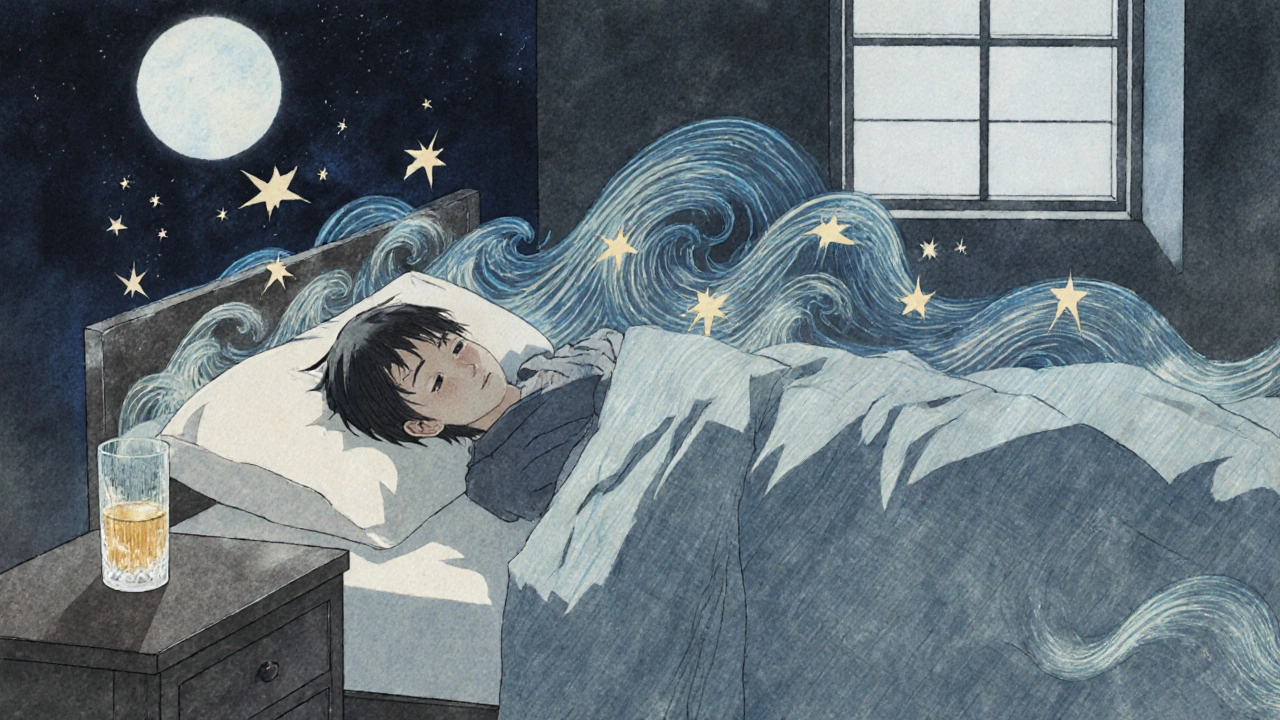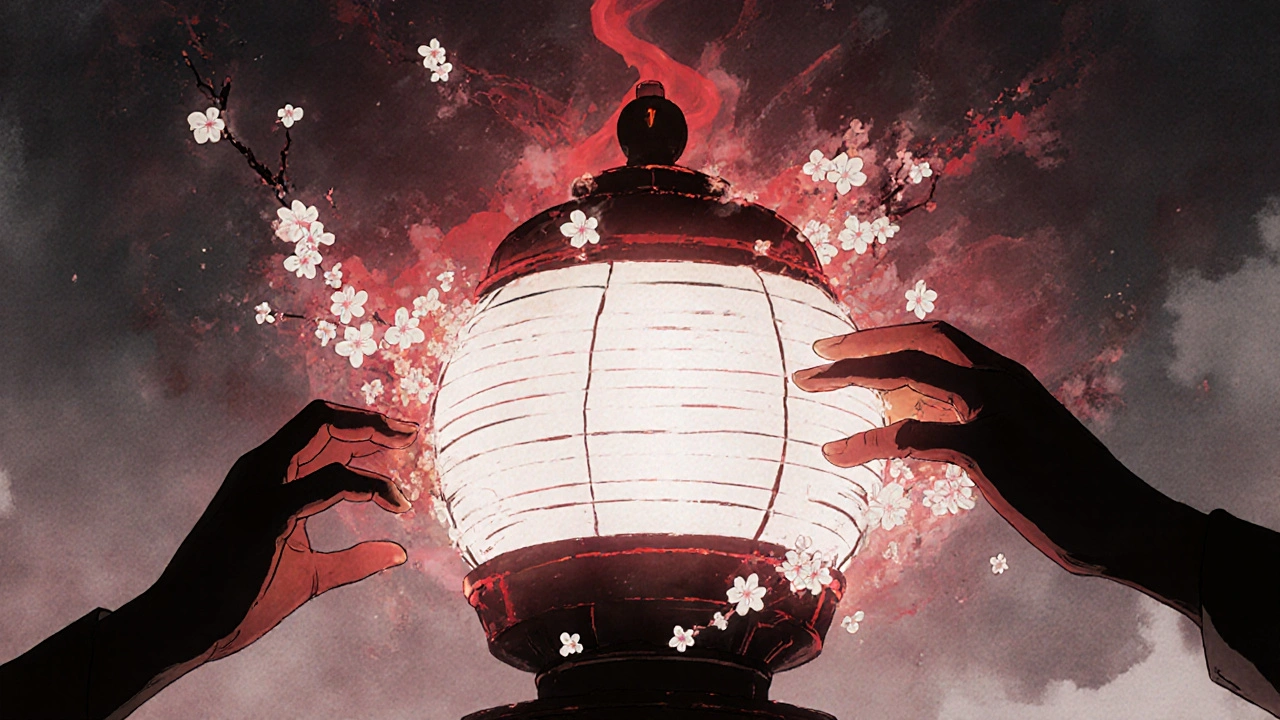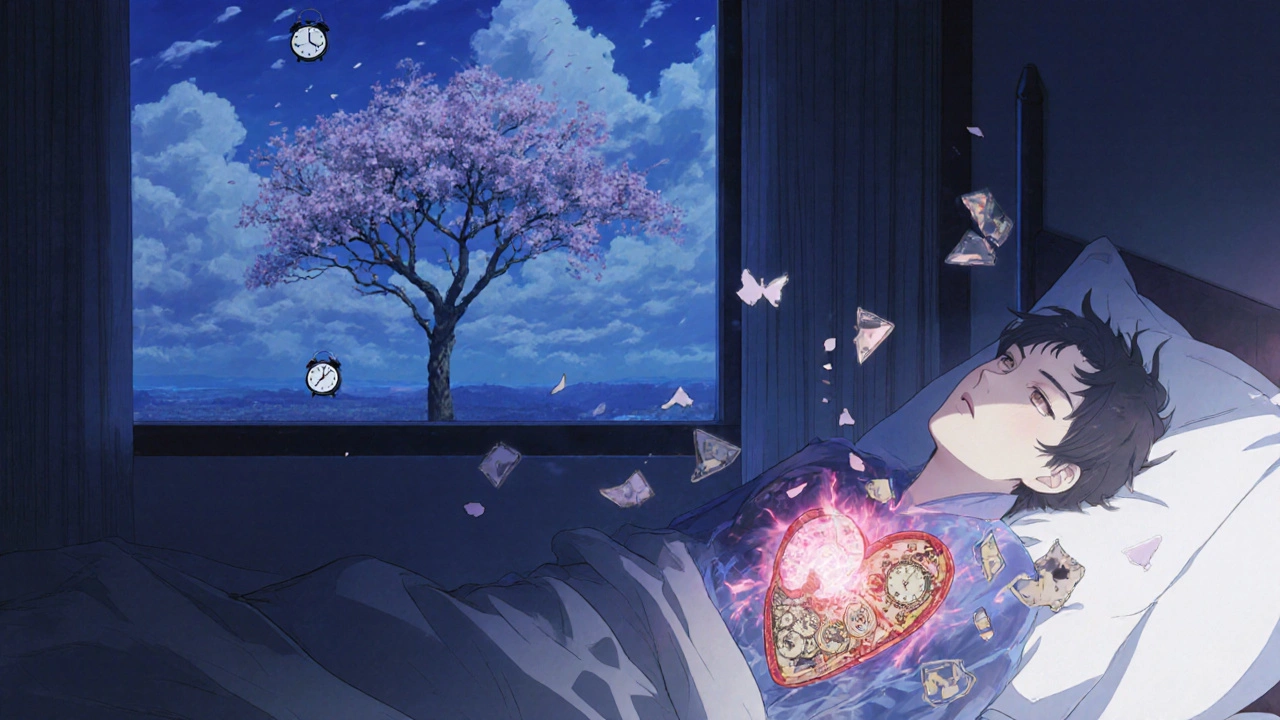Alcohol and Sleep: How Drinking Affects Fragmentation, Apnea, and Next-Day Functioning

Many people believe a nightcap helps them sleep better. It feels like a relaxant-warm, familiar, and calming. But what actually happens to your body after that glass of wine or beer before bed? The truth is, alcohol doesn’t improve sleep. It disrupts it. And the damage doesn’t stop when you wake up.
Alcohol Tricks Your Brain Into Falling Asleep Faster-Then Ruins the Rest
Alcohol does make you fall asleep quicker. That’s not a myth. If you drink 2-3 standard drinks (about 0.4-0.8 g/kg of body weight), you’ll likely nod off faster than usual. But here’s the catch: that initial drowsiness is just the first phase of a two-part disaster.
As your body metabolizes alcohol-roughly one drink per hour-the sedative effect fades. By the time your blood alcohol level drops, usually around 3 a.m. after a few drinks, your brain goes into reverse. Instead of staying in deep, restful sleep, you start waking up more. Your sleep becomes fragmented. You might not remember it, but you’re tossing and turning, shifting between light and wakeful states.
Polysomnography studies show this clearly: alcohol increases deep sleep (N3) in the first half of the night, but then slashes it in the second half. What replaces it? Light sleep (N1 and N2) and wakefulness. The result? You’ve slept for 7 hours, but your body didn’t get the rest it needed.
REM Sleep Gets Crushed-And That’s a Big Problem
REM sleep is when your brain processes emotions, consolidates memories, and boosts creativity. It’s also when most dreaming happens. Alcohol suppresses REM sleep hard-up to 50% less in the first half of the night. That might sound like a good thing if you’re having nightmares, but it’s not.
When alcohol leaves your system, your brain tries to make up for lost REM. That’s called REM rebound. You get more intense dreams, sometimes nightmares, in the final hours of sleep. Your brain is scrambling to catch up, but it’s not the same as natural REM. You don’t get the emotional reset or memory repair you need.
One study found that even one standard drink reduces REM sleep by 9.3%. After a binge, REM suppression can last for days. Over time, this disrupts your emotional stability, makes you more reactive to stress, and lowers your ability to think clearly.
Alcohol Makes Sleep Apnea Worse-Even If You Don’t Think You Have It
If you snore, or have been told you stop breathing at night, alcohol makes it worse. But even if you don’t think you have sleep apnea, alcohol can trigger it.
Alcohol relaxes the muscles in your throat. That’s why you might feel looser and more relaxed after a drink. But in your airway, that relaxation causes the tissues to collapse, blocking airflow. The result? More apneas (pauses in breathing) and hypopneas (shallow breaths).
Research from the American Academy of Sleep Medicine shows that each standard drink before bed increases your apnea-hypopnea index (AHI) by 20%. That means if you normally have mild sleep apnea, one drink could push you into moderate territory. Two drinks? Your risk jumps even higher.
And it’s not just about breathing. Oxygen levels drop during these events. One study found alcohol reduces nighttime oxygen saturation by 3-5 percentage points. That’s enough to stress your heart, spike your blood pressure, and make you feel exhausted the next day-even if you didn’t fully wake up.

Next-Day Effects Are Real-Even If You Feel Fine
You wake up. You had 7 hours. You feel okay. So what’s the problem?
The problem is your brain didn’t get the right kind of rest. Even if total sleep time looks normal, alcohol steals your most restorative sleep: slow-wave sleep (N3). One study found sleep after alcohol leads to 15.3% less slow-wave sleep. That’s the stage where your body repairs tissues, strengthens your immune system, and clears brain waste.
Without it, your next-day performance drops. Cognitive processing speed slows by 12.7%. Working memory shrinks by 9.4%. Reaction times get slower. You might not notice it, but you’re less sharp. You miss details. You forget names. You make small mistakes.
And then there’s emotion. After alcohol-disrupted sleep, people show 31.2% greater emotional reactivity. A minor annoyance feels like a crisis. You snap at coworkers. You cry over something small. Your mood swings aren’t just ‘bad sleep’-they’re directly tied to the lack of REM and slow-wave recovery.
The Cycle: Poor Sleep Leads to More Drinking
Here’s the dangerous loop: you drink to sleep better. You wake up tired. You think, ‘I need another drink to help me sleep tomorrow.’ So you do. And the cycle gets stronger.
Studies show that sleep deprivation after drinking increases the urge to consume more alcohol-especially in people who already struggle with sleep. This isn’t just about habit. It’s biology. Your brain’s adenosine system, which naturally builds up during wakefulness to signal sleepiness, gets messed up by alcohol. After binge drinking, your brain doesn’t produce enough adenosine to drive natural sleep pressure. So you feel wired but tired. You reach for alcohol again to force sleep.
This cycle is a major reason why insomnia is so common in people recovering from alcohol use disorder. Up to 70% of those in early recovery report severe sleep problems. And those problems can last 3-6 months after quitting. That’s why sleep support is a critical part of addiction treatment.

How Much Is Too Much? The Numbers Don’t Lie
You might think, ‘I only have one drink.’ But even that’s enough to hurt your sleep.
A 2023 meta-analysis in Addiction Biology reviewed every major study on alcohol and sleep. The conclusion? No dose is beneficial. One drink reduces REM sleep by 9.3%. It increases sleep fragmentation by 11.7%. It raises your heart rate by 6-7 beats per minute during the night.
Regular drinkers-those who have alcohol before bed 3-4 nights a week-are 38% more likely to develop chronic insomnia. That’s not a small risk. That’s a clear medical warning.
And it’s not just about quantity. Timing matters too. Drinking within 2 hours of bedtime increases the chance of nighttime awakenings by 67%, compared to 39% in non-drinkers. Even if you finish your drink early, if it’s still in your system when you fall asleep, it’s still disrupting you.
What Should You Do Instead?
If you’re using alcohol to help you sleep, you’re not alone. But you’re also not helping yourself.
Try these instead:
- Stop drinking at least 3 hours before bed. That gives your body time to metabolize most of it.
- Replace the nightcap with a warm herbal tea, like chamomile or valerian root.
- Keep your bedroom cool, dark, and quiet. Use blackout curtains if needed.
- Try a 10-minute breathing exercise before bed-inhale for 4 counts, hold for 4, exhale for 6. Repeat 5 times.
- If you’re still struggling, talk to a sleep specialist. Cognitive behavioral therapy for insomnia (CBT-I) is proven to work better than any sleep aid, including alcohol.
Alcohol might feel like a solution, but it’s a trap. It doesn’t fix sleep. It steals it. And the cost isn’t just a tired morning-it’s your long-term health, your emotional balance, and your brain’s ability to recover.
Does alcohol help you sleep better?
No. While alcohol may help you fall asleep faster, it disrupts sleep quality by reducing REM and slow-wave sleep, increasing awakenings, and worsening sleep apnea. Even one drink lowers sleep quality, according to multiple peer-reviewed studies.
Can alcohol cause sleep apnea?
Yes. Alcohol relaxes throat muscles, making airway collapse more likely. Each standard drink before bed increases the apnea-hypopnea index (AHI) by 20%. People with existing sleep apnea should avoid alcohol within 3 hours of bedtime.
Why do I wake up in the middle of the night after drinking?
As alcohol metabolizes, your brain rebounds from its sedative effect. This causes increased wakefulness, lighter sleep, and REM rebound-leading to frequent awakenings, especially in the second half of the night. You may not remember them, but your sleep is fragmented.
Does alcohol affect next-day performance?
Yes. Even if you feel fine, alcohol-disrupted sleep reduces cognitive processing speed by 12.7% and working memory by 9.4%. Emotional reactivity also increases by over 30%, making you more irritable and less able to handle stress.
How long does it take for sleep to improve after quitting alcohol?
For most people, sleep architecture begins improving within days, but full recovery can take 3-6 months, especially after long-term or heavy use. Insomnia is common during early recovery and often requires targeted treatment like CBT-I.
Is there a safe amount of alcohol before bed?
No. Research shows even one standard drink reduces REM sleep by 9.3% and increases sleep fragmentation by 11.7%. There is no dose that improves sleep quality. The safest choice is to avoid alcohol close to bedtime entirely.

Monika Wasylewska
November 21, 2025 AT 20:51One drink and my sleep still feels like trash. I used to think it was just me-turns out, science says I’m not crazy. Just sober.
Jackie Burton
November 23, 2025 AT 18:12They don’t want you to know this, but alcohol is a government-backed sleep disruptor. The FDA and Big Pharma colluded to keep CBT-I expensive while pushing booze as a ‘sleep aid’ so we stay dependent on pills later. Check the funding sources on those ‘studies’-they’re all tied to liquor conglomerates. Wake up.
Philip Crider
November 25, 2025 AT 10:50Bro. I used to drink wine every night to chill. Then I realized I was waking up at 3 a.m. like a zombie who forgot how to breathe. 🤯 Now I do breathing exercises-4 in, 4 hold, 6 out. Feels like my brain finally got a reboot. Also, chamomile tea tastes like a hug from a grandma who never judged me. 🌿❤️
Diana Sabillon
November 26, 2025 AT 20:59This made me cry. Not because I’m upset, but because I finally understand why I’ve been so emotionally raw lately. I thought it was work stress. Turns out, it’s that nightly glass of pinot. I’m going to try the tea and breathing. Thank you for writing this so gently.
neville grimshaw
November 27, 2025 AT 11:33Oh, so alcohol’s not a ‘sleep aid’? Shocking. I’m sure the 17th-century French aristocrats who drank brandy before bed were just delusional. Next you’ll tell me that smoking doesn’t ‘clear the mind’ and that coffee at midnight isn’t a ‘ritual of productivity.’ Please. I’m not giving up my nightcap for some nerdy polysomnography graphs. I’d rather be tired and cultured than wide awake and boring.
Carl Gallagher
November 27, 2025 AT 19:45I’ve been sober for 14 months now, and I can tell you-sleep didn’t magically fix itself on day 1. It took weeks just to stop waking up every 90 minutes like a startled deer. Then came the dreams. Holy hell, the dreams. I was having full-blown cinematic nightmares about flying through oceans of molasses. But slowly, over three months, the deep sleep came back. Not just ‘more sleep’-actual rest. My body started repairing things I didn’t even know were broken. It’s not glamorous. It’s not quick. But it’s real. And if you’re reading this and still drinking to sleep? Just try three weeks without. You might be surprised what you wake up to.
bert wallace
November 28, 2025 AT 01:19Interesting. I’ve noticed that if I drink after 8 p.m., I wake up with a dry mouth and a racing heart-even if I don’t remember tossing and turning. Never connected it to apnea. I snore a bit, but I thought it was just ‘normal.’ Guess I’m not normal. Gonna try the 3-hour rule. No promises, but I’m willing to experiment.
Neal Shaw
November 28, 2025 AT 03:49The meta-analysis cited is from Addiction Biology (2023), and it’s robust-sample sizes >12,000 across 47 studies, controlled for age, BMI, and baseline sleep quality. The 9.3% REM reduction per drink is consistent across all subgroups. Also, the 20% AHI increase per drink is from a 2021 RCT in the Journal of Clinical Sleep Medicine. The mechanisms are well-documented: GABA potentiation → upper airway collapse → hypoxia → sympathetic activation → sleep fragmentation. This isn’t opinion. It’s physiology. The only ‘myth’ here is the belief that alcohol helps.
Hamza Asghar
November 28, 2025 AT 18:46Lmao you people think this is news? I’ve been telling my friends for years that ‘wine sleep’ is just sleep debt with extra steps. You think you’re relaxing? You’re just chemically sedating your brain into a coma that doesn’t fix anything. And now you’re gonna replace it with ‘chamomile tea’ like it’s some spiritual ritual? Get real. The real fix is discipline. Stop using substances to cope with poor sleep hygiene. Sleep is a skill. You don’t get to cheat it with booze and then whine about feeling tired. You’re not special. You’re just lazy. And now you’re making it worse with herbal tea vibes.